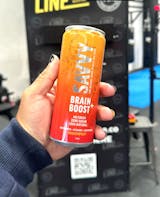Vitamin B1 - Thiamine

Thiamine (Vitamin B1) is an essential vitamin that your body and mind use, particularly the nervous system, heart, and brain. It is essential because all tissues in the body require B1 in order to function properly.
Interestingly, thiamine was the first of the B-complex family to be discovered, hence the name B1. Thiamine is water-soluble and helps heavily in energy production, enhances the body’s ability to withstand stress, maintains healthy nervous and cardiovascular functioning and helps turn food into energy.
Our body concentrates the use of vitamin b1 on the areas of the body that are the most metabolically active (meaning they use a lot of energy). As the brain uses more energy than any other organ, it heavily relies on vitamin b1 to ensure the conversion of food into energy.
Due to the many benefits of thiamine we have used 200% of Australia's Recommended Dietary Intake of vitamin B1 in all Savvy products.
|
Thiamine Fast Facts
|
- Thiamine boosts immunity and resistance to stress.
- Thiamine supports optimal mental performance through helping with the development of the myelin sheath.
- Thiamine Improves Energy Production, Mood and Alertness.
|
Main benefits for Savvy
- Energy production, as well as improved mood and alertness
- Immune boosting and resilience to stress and anxiety
- Supports mental performance and helps myelin sheath development

To make it easy to identify all the different studies - we will highlight them for you!
We really hope you enjoy our many years of research when formulating Savvy...
Thiamine Improves Energy Production, Mood and Alertness
The body needs thiamine to make adenosine triphosphate (ATP) which is the body’s main energy-carrying molecule. This is a molecule that is responsible for transportation of energy within cells. Thiamine increases mood, energy, and alertness.
Scientific sources:
Lonsdale, D. ‘A review of the biochemistry, metabolism and clinical benefits of thiamin(e) and its derivatives’ in Evidence-based complementary and alternative medicine, Volume 3, Issue 1, March 2006, pp 49-59 [Link]
“Thiamin(e), also known as vitamin B1, is now known to play a fundamental role in energy metabolism”
Lewis, J, E. et al. ‘The Effect of Methylated Vitamin B Complex on Depressive and Anxiety Symptoms and Quality of Life in Adults with Depression’ in Journal of International Scholarly Research Notices Psychiatry, Volume 2013, Article ID 621453, pp 1-7. [Link]
“The Max Stress B [B1,2,3,6,12 combination] formula showed modest improvements in mood and mental health according to the BDI, BAI, and SF-36, making our findings consistent with the prior studies. Thus, our study shows that a high quality, whole-food dietary supplement may offer an opportunity for adults with depression to improve mood symptoms and quality of life.”
Bell, IR, et al. ‘Brief communication. Vitamin B1, B2, and B6 augmentation of tricyclic antidepressant treatment in geriatric depression with cognitive dysfunction.’ in Journal of the American College of Nutrition. Volume 11, Issue 2, April 1992, pp 159-163 [Link]
“This was a 4-week randomized placebo-controlled double-blind study to assess augmentation of open tricyclic antidepressant treatment with 10 mg each of vitamins B1, B2, and B6 in 14 geriatric inpatients with depression. The active vitamin group demonstrated significantly better B2 and B6 status on enzyme activity coefficients and trends toward greater improvement in scores on ratings of depression and cognitive function”
Taskiran, Ahmet Sevki, and Mustafa Ergul. ‘The preventive effects of thiamine against pentylenetetrazole-activated seizures in rats and pentylenetetrazole-activated neurotoxicity in SH-SY5Y human neuroblastoma cell line.’ Chemico-Biological Interactions. Volume 109447. 2021 [Link]
Administration of Thiamine to seizure-induced rats found that delay in the initiation of epileptic seizures and memory damage. In addition to this, neurotoxicity was reduced and antioxidant activity was enhanced.
Dhir, Shibani, et al. ‘Neurological, psychiatric, and biochemical aspects of thiamine deficiency in children and adults.’ Frontiers in psychiatry. Volume 10. Issue 207. 2019 [Link]
This literature review focuses on the neurological and psychological effects of thiamine deficiency. The review states that the deficiency of the vitamin causes mood changes like agitation, confusion and generalized malaise and the administration of the vitamin produced a positive mood in elderly and young individuals.
Smith, Taryn J., et al. ‘Thiamine deficiency disorders: a clinical perspective.’ 2020. [Link]
This review article finds a strong correlation of thiamine deficiency with disruption of energy in the body. The mechanism of energy deficiency is by reduction of the enzymes that are supplied to the Krebs cycle to produce ATP. A decrease in the energy in the body could lead to chronic energy deficiency that can cause malnutrition and weight loss. Neurologically, the deficiency can cause energy disruption to the neurons and increased oxidative stress, causing abnormalities in the blood-brain barrier.
DiNicolantonio, James J., Jing Liu, and James H. O'Keefe. ‘Thiamine and cardiovascular disease: a literature review.’ Progress in cardiovascular diseases. Volume 61. Issue. 1. 2018. pp. 27-32 [Link]
“Thiamine plays an important role in energy metabolism in the human body”
Pavlov, Dmitrii, Anna Gorlova, et al. ‘Enhanced conditioning of adverse memories in the mouse modified swim test is associated with neuroinflammatory changes–Effects that are susceptible to antidepressants.’ Neurobiology of learning and memory. Volume 172. Issue 107227. 2020 [Link]
The research study identified the antidepressant properties of thiamine at 200mg/kg/day for 2 weeks that regulated anti-oxidant, anti-stress and anti-inflammatory properties and reduced floating behaviour in mice. This was due to the mechanism of enhancement of the protein carbonyl levels in the brain, thereby improving the oxidation processes.
AlAmmar, Welayah A., et al. ‘Food and Mood: the Corresponsive Effect.’ Current Nutrition Reports. 2020. Pp. 1-13 [Link]
The literature review summarizes that the deficiency or insufficiency of Thiamine can cause depression, since the vitamin can result in malfunction in the synthesis of the required neurotransmitters, leading to depression. Other mechanisms includes induction of oxidative stress, leading to decreased hippocampal volume and damage in the neurons. A dose of 10 mg thiamine for 6 weeks led to a reduction in the depression symptoms in the elderly and a dose of 50 mg/day for 2 months improved the energy status and clear-headedness in young women.
Dhir, Shibani, et al. ‘Neurological, psychiatric, and biochemical aspects of thiamine deficiency in children and adults.’ Frontiers in psychiatry. Volume 10. Issue 207. 2019 [Link]
This literature study summarizes that there is a direct correlation between thiamine deficiency, depression and major depressive disorders. The review also mentions that a 12 week, randomized, double-blind clinical trial effectively improved depression when Thiamine was administered for 6 weeks.
Thiamine boosts immunity and resistance to stress
Vitamin B1 is sometimes called an “anti-stress” vitamin because it may improve immunity and also enhance the body’s ability to cope with stress.
Scientific Sources:
Stough, C, et al. ‘The effect of 90 day administration of a high dose vitamin B-complex on work stress.’ in Human Psychopharmacology. Volume 26, Issue 7, October 2011, pp 470-476. [Link]
“Sixty participants completed the 3-month, double-blind, randomised, placebo-controlled trial in which personality, work demands, mood, anxiety and strain were assessed. ...the vitamin B complex treatment groups reported significantly lower personal strain and a reduction in confusion and depressed/dejected mood after 12 weeks. The results of the study are consistent with two previous studies examining…supplementation of a B multivitamin.”
Kennedy, David O. et al. ‘Effects of high-dose B vitamin complex with vitamin C and minerals on subjective mood and performance in healthy males’ in Journal of psychopharmacology. Volume 211, Issue 1, July 2010, pp 55-68 [Link]
“Healthy members of the general population may benefit from augmented levels of vitamins/minerals via direct dietary supplementation. Specifically, supplementation led to improved ratings of stress, mental health and vigour and improved cognitive performance during intense mental processing.”
Pletsityi, A, D. ‘Changes in activity of some mechanisms of specific and nonspecific immunity in vitamin B1 deficiency’ in Bulletin of Experimental Biology and Medicine. Volume 88, Issue 1, July 1979, pp-741-743 [Link]
“The effect of thiamine deficiency on the immune response and activity of certain mechanisms of natural immunity was studied…”
Calingsan, N.Y. et al. ‘Oxidative stress is associated with region–specific cell death during thiamine deficiency.’ in Journal of Neuropathology and Experimental Neurology. Volume 58, Issue 9. 1999. Pp. 946-958. [Link]
Huang, YC et al. ‘Prediction of all-cause mortality by B group vitamin status in the elderly.’ in Clinical nutrition (Edinburgh, Scotland). Volume 31, Issue 2, April 2012, pp 191-198. [Link]
“Higher vitamin B-1 and B-6 intakes and plasma pyridoxal-phosphate were associated with lower risk of mortality up to 10 years and could be achieved by increased dietary diversity.”
Gorlova, Anna, et al. ‘Thiamine and benfotiamine counteract ultrasound-induced aggression, normalize AMPA receptor expression and plasticity markers, and reduce oxidative stress in mice.’ Neuropharmacology. Volume 156. pp. 107543. 2019. [Link]
Oxidative stress can cause cognition impairment and neurological problems. The research paper focuses on the ability of thiamine to reduce stress-induced by ultrasound in mice at a dose of 200 mg/kg/day in drinking water.
Mkrtchyan, Garik V., et al. ‘Thiamine preserves mitochondrial function in a rat model of traumatic brain injury, preventing inactivation of the 2-oxoglutarate dehydrogenase complex.’ Biochimica et Biophysica Acta (BBA)-Bioenergetics. Volume 1859. Issue 9. pp. 925-931. 2018 [Link]
Administration of thiamine restored the activity of mitochondrial respiration and prevented neuroinflammation. It was also seen to reduce Endoplasmic Reticulum related stress, the occurrence of which can lead to neurodegenerative diseases.
Thiamine supports optimal mental performance through helping with the development of the myelin sheath
Vitamin B1 helps with the development of the myelin sheath, which is a coat that wraps around nerves to protect them.
The myelin sheath is an important part of the nervous system and is vital for optimal cognitive function. Myelin allows signals to travel faster, which can make everything in the brain work better.
Myelin controls the speed of impulse conduction through axons, and the synchrony of impulse traffic between distant brain regions is critical for optimal mental performance and learning.
Scientific sources:
La Rue A, et al. ‘Nutritional status and cognitive functioning in a normally aging sample: a 6-y reassessment.’ in The American journal of clinical nutrition, Volume 65, Issue 1, January 1997 pp 20-29 [Link]
“Several significant associations (P < 0.05) were observed between cognition and concurrent vitamin status, including better abstraction performance with higher biochemical status and dietary intake of thiamine, riboflavin, niacin, and folate (rs = 0.19-0.29) and better visuospatial performance...Higher past intake of vitamins E, A, B-6, and B-12 was related to better performance on visuospatial recall and/or abstraction tests (rs = 0.19-0.28). Use of self-selected vitamin supplements was associated with better performance on a difficult visuospatial test and an abstraction test.”
Martin, R, P. et al. ‘The Role of Thiamine Deficiency in Alcoholic Brain Disease‘ in National Institute on Alcohol Abuse and Alcoholism Publication July 2004, pp 134-142. [Link]
“Thiamine, also known as vitamin B1, is an essential nutrient required by all tissues, including the brain. The human body itself cannot produce thiamine but must ingest it with the diet.”
Robertson, D, M et al ‘Ultrastructural features of early brain stem lesions of thiamine-deficient rats.’ in The American Journal of Pathology, Volume 52, Issue 5, May 1968, pp 1081-1097 [Link]
“Recent studies, however, have emphasized that early and mild lesions appear predominantly to involve glia and myelin sheaths with relative sparing of neutrons”
Bubko, I et al ‘The role of thiamine in neurodegenerative diseases’ in Postepy higieny i medycyny doswiadczalnej (Polish), Volume 69, Issue 21, September 2015, pp 1096 - 1106. [Link]
“Vitamin B1 (thiamine) plays an important role in metabolism. It is indispensable for normal growth and development of the organism. Thiamine has a favourable impact on a number of systems, including the digestive, cardiovascular and nervous systems. It also stimulates the brain and improves the psycho-emotional state... It was proved that supporting vitamin B1 therapy not only constitutes neuroprotection but can also have a favourable impact on advanced neurodegenerative diseases”
Fields, R. ‘White matter in learning, cognition and psychiatric disorders’ in Trends in Neurosciences, Volume 31, Issue 7, July 2008, pp 361 - 370 [Link]
“... myelin can contribute to cognitive development and learning. Considering the possible involvement of myelin in cognitive function and psychiatric illness expands the field of learning research to include the acquisition of complex skills and abilities that require prolonged practice, involving integration of information flow between multiple cortical regions.”









